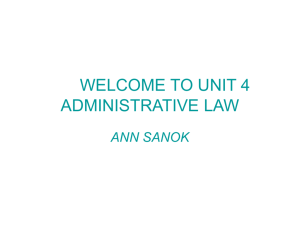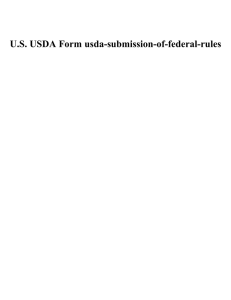Consolidated slides for make-up class.
advertisement
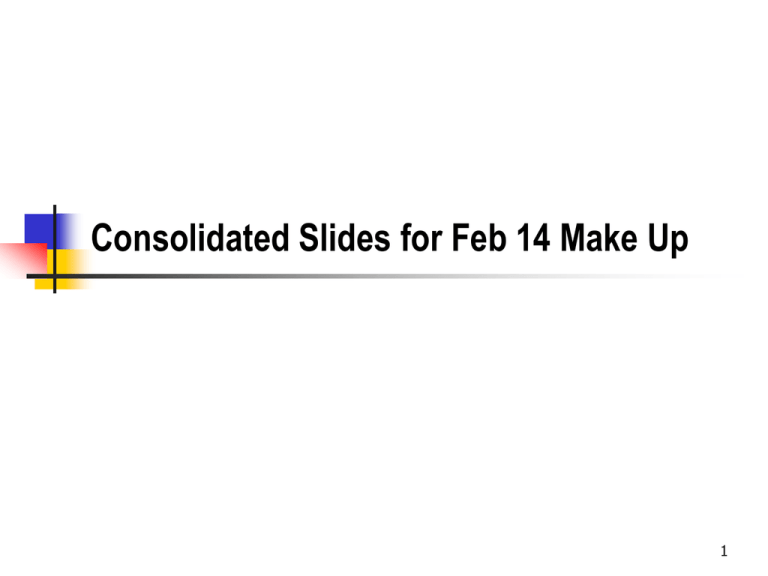
Consolidated Slides for Feb 14 Make Up 1 Chapter 4 2 De minimis Test Some deprivations are too insignificant to trigger a right to a hearing Putting a cop on paid sick leave did not trigger due process Otherwise the courts will be in every employment action This is key issue in 1983 actions - how hard/often can the prison guard hit the prisoner? 3 Alternative Remedies Due process is not the only remedy for many actions Contracts with the government are not property but are agreements governed by contract law. The Court of Claims system deals with these. Unger v. National Residents Matching Program Failing to admit resident after signing the match contract did not trigger a hearing, but would support a breach of contract action. Does you client really need a hearing, or do you have a contract action? Which is better? 4 Any Pre-Action Hearing Rights after Matthews? 5 Cleveland Board of Education v. Loudermill, 470 U.S. 532 (1985) Firing a teacher Applying the Matthews factors, how do you argue that an informal pre-termination hearing is required? How is this different from Matthews itself as regards to the ability to cure problems with a post-termination hearing? 6 Gilbert v. Homar, 520 U.S. 924 (1997) Has there been a substitute for a hearing? Who did the guard work for? Why did this make his arrest for marijuana possession a particular problem? Did he get any due process prior to this suspension from the workplace? What was the importance of the decision by an "independent body" and what was the body? What are the limits of this opinion? Why does this being a temporary suspension matter? 7 Goss v. Lopez, 419 U.S. 565 (1975) High school student suspended from school What due process did the court require? What was the Mathews analysis? 8 Ingraham v. Wright, 430 U.S. 651 (1977) School paddling case What due process did the court require? What was the Mathews analysis? How does the analysis differ from Goss? Why? Do we still paddle students? Why not? Is hauling them to jail more protective of their rights? 9 Board of Curators of the Univ. of Missouri v. Horowitz, 435 U.S. 78 (1978) Academic suspension case for a medical student What due process did the court require? What was the Mathews analysis? What would be the costs of having due process for every failing student? What would be the facts at issue? Would this analysis differ if this had been a disciplinary suspension? 10 Law School Disciple and Due Process Why does Mathews result in different standards for academic and disciplinary suspensions? How do we tell whether it is an academic or disciplinary issue? What about plagiarism? Cheating? What is the role of special expertise and deference? Is this just judicial deference to agency expertise and policy making, with the school as agency? 11 Bias in Administrative Hearings 12 What does a Right to an Impartial Judge Mean? What are sources of bias? How is the analysis different for agencies than for Article III courts? What is separation of functions? How does it reduce potential bias? This argument lead to the central panel of ALJs in LA. 13 The Problem of Proof of Bias We will see more about this in the chapter on judicial review The core problem is that you cannot judge bias by only looking at the record, but the courts are unwilling to allow discovery into the motives of the judges It would be like getting to depose an Article III judge as part of the appeal of a summary judgment. 14 Exception to the Requirement of Separation of Functions for the Heads of Agencies 554(d) This subsection does not apply ... (C) to the agency or a member or members of the body comprising the agency. The “agency” means the secretary in an agency with a single head. The “body comprising the agency” is the commissioners or board members of an agency headed by a committee. 15 Withrow v. Larkin, 421 U.S. 35 (1975) State medical licensing board What were the functions? What did the doc request? Why did the court find that it was not necessary to separate them? The Supreme Court reiterated the fundamental importance of the need for an unbiased decision maker, but it found that the mere combination of investigatory, prosecutorial, and adjudicatory functions in the same entity did not necessarily make the entity biased in adjudicating. Why is the record so important in these cases? Why would an independent ALJ be a particular problem for these cases? 16 Disqualifying an Administrative Law Decisionmaker for Bias What is the United States Supreme Court standard? “irrevocably closed mind” What does it take to show this? What happened in Texaco, Inc. v. FTC, 336 F.2d 754 (D.C. Cir. 1964)? Why does mean that the head of the EPA needs to be circumspect in comments about BP? Would generalized statements, such as the FCC chair deploring advertising to children, meet the standard? What is the Doctrine of Necessity? 17 Kennecott Copper Corp. v. FTC, 467 F.2d 67 (10th Cir. 1972) Kennecott owned a small coal company, then bought a big one - Peabody FTC investigated this as an antitrust violation A commissioner gave an interview and explained that the agency saw Kennecott as removing itself as a competitor. Kennecott claimed this showed bias The court said no, but warned the agency to be more careful. 18 Pillsbury Co. v. FTC, 354 F.2d 952 (5th Cir. 1966) Who was meddling in the FTC case? What did Senator Kefauver say? What the court was worried about: However, when such an investigation focuses directly and substantially upon the mental decisional processes of a Commission in a case which is pending before it, Congress is no longer intervening in the agency's legislative function, but rather, in its judicial function. At this latter point, we become concerned with the right of private litigants to a fair trial and, equally important, with their right to the appearance of impartiality, which cannot be maintained unless those who exercise the judicial function are free from powerful external influences. 19 The Pillsbury Ruling What happens if the court disqualifies the commission because of the intimidation in the Senate hearing? The court’s solution: Although we conclude that the course of the questioning before the Senate subcommittee in June 1955 deprived the petitioner of the kind of hearing contemplated by the Supreme Court ... we are convinced that the Commission is not permanently disqualified to decide this case. We are convinced that the passage of time, coupled with the changes in personnel on the Commission, sufficiently insulate the present members from any outward effect from what occurred in 1955. 20 What should Congress be able to do in Hearings and for Casework? Congressional case work – doing things for constituents such as checking on Social Security Benefits or trying to get bank regulators to lay off. What should be allowed and what would be forbidden under Pillsbury and what you know about due process? What if the president is meddling? How does this change the issues? Is he the decider? 21 Rulemaking Introduction to The Regulators Jargon Alert Rule, legislative rule, or regulation They all mean the same thing Has the same effect as a statute passed by the legislature Non-Legislative rule Has no legal effect, but shows what the agency thinks the law is Many names - interpretive rule, guidelines, guidance document, anything but rule or regulation 23 The Agency as Legislature The modern rulemaking process got started in the 1950s and really accelerated in the 1970s Parallels the growth of federal agencies In theory, the federal courts encourage agency rulemaking. It reduces litigation and simplifies the litigation that ensues. 24 The Power to Make Rules The power to make rules must be delegated by the legislature. If the enabling legislation (the legislation creating an agency) is silent, the agency cannot make rules The delegation may be broad, allowing the agency great discretion, or very narrow. We will look at the standards for reviewing this delegation later in the course 25 Must the Agency Make Rules? If the agency has the power to make rules, it has the discretion on what rules to make and when to make them. The legislature can put provisions in the agency legislation requiring that certain rules be made, and the timeframe for making them. The Clean Air Act required rulemaking to flesh out detailed technical standards Unless there is a legislative directive, it is difficult to get the courts to force an agency to make rules Not impossible, as we will see latter. 26 Why Make Rules? Many statutes have too little detail to be enforced without additional rules. Rules can be used to tailor a statute to new circumstances. Rules provide a chance for the for the public to participate in the regulatory process Once promulgated, a rule in binding on every party, reducing the need for adjudications. 27 Uniformity Rules set up a general framework that treats all parties uniformly Rules are the fairest way to make big regulatory changes If the agency does not have rules, it can change enforcement policy from case to case, and is also at the mercy of judges to accept or reject agency standards 28 Adoption of National Standards National standards can be adopted through agency rules, harmonizing practice across jurisdictions National building codes CDC guidelines on food sanitation Recommendations of the Advisory Committee on Immunization Practices LA and building codes 29 Agency Efficiency While a rulemaking can be expensive and time consuming, it can settle issues which might otherwise have to be litigated in every enforcement case Rulemaking can also eliminate many hearings by resolving factual questions In disability cases, rules can be used to establish what constitutes a disability, rather than making it as case by case determination. 30 Agency Oversight You can control the outcome of rulemaking much easier than that of adjudications Not dependent on ALJs (administrative law judges) This especially important in LA More input from across the agency Input from the public as well Directly controlled by agency policy makers 31 The Politics of Rulemaking Congress often dodges the hardest issues and leaves them to agency rulemaking Most of these involve cost-benefit analysis How do you trade off automobile safety with price and fuel efficiency? Are you more worried about delaying the entry of new drugs or the about allowing the sale of a drug with dangerous side-effects? Do you want cheap power at the cost of lots of asthma and the Grand Canyon full of smoke? 32 Downside of Rulemaking Trials (adjudications) involving single parties can be more flexible in the individual cases Adjudications are useful when you are not sure what the rule should be and need more info and a chance to experiment Rules can be so abstract or overbroad that they are expensive or difficult to follow Like statutes Agencies can promulgate rules that Congress would never pass - Green House Gas Regulations. 33 Rulemaking Ossification The courts and legislatures have increased the burden on rulemaking, especially in states Rulemaking has gotten so complex and time consuming it has lost some of its value Complicated by regulatory conflict and incompetent agency practice Rulemaking can go on for years What is the legal value of a proposed rule that has not been finalized? The Medicare anti-kickback regulations were delayed for years between the proposed rule and the final rule 34 Definition of a Rule APA 551(4) (4) 'rule' means the whole or a part of an agency statement of general or particular applicability and future effect designed to implement, interpret, or prescribe law or policy or describing the organization, procedure, or practice requirements of an agency and includes the approval or prescription for the future of rates, wages, corporate or financial structures or reorganizations thereof, prices, facilities, appliances, services or allowances therefor or of valuations, costs, or accounting, or practices bearing on any of the foregoing; Not a clear definition Things that are not adjudications or licensing 35 LA Definition 6) "Rule" means each agency statement, guide, or requirement for conduct or action, exclusive of those regulating only the internal management of the agency and those purporting to adopt, increase, or decrease any fees imposed on the affairs, actions, or persons regulated by the agency, which has general applicability and the effect of implementing or interpreting substantive law or policy, or which prescribes the procedure or practice requirements of the agency. "Rule" includes, but is not limited to, any provision for fines, prices or penalties, the attainment or loss of preferential status, and the criteria or qualifications for licensure or certification by an agency. A rule may be of general applicability even though it may not apply to the entire state, provided its form is general and it is capable of being applied to every member of an identifiable class. The term includes the amendment or repeal of an existing rule but does not include declaratory rulings or orders or any fees. 36 Functional Definitions General applicability, as opposed to specific parties Prospective Binding on the agency as well as on the public 37 Notice-and-Comment Rulemaking APA Procedures http://biotech.law.lsu.edu/Courses/study_aids/adl aw/553.htm The Register The Federal Register LA Register Electronic Notice http://www.regulations.gov Why Have Public Participation? Public participation has great political benefit in broadening the acceptability of the rules. Public comments can identify technical and legal problems with the rules Publication of proposed rules allows politicians to become involved to protect the interests of their constituents Public participation limits executive power and makes it more palatable to the courts to have agencies making laws While the agency may take comments at public hearings, it is usually done in writing. 39 Attacking Rulemaking Once a rule has been properly promulgated through notice and comment, it can only be attacked by attacking the published basis for the rule, and that must be done relatively soon after promulgation. We will see in the movie how the opponents of the rule work to get their changes made before the rule is finished. 40
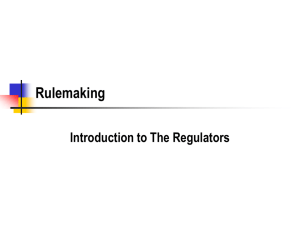
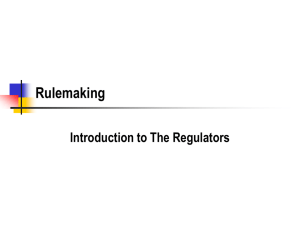
![Minnesota Department of [Name] MEMORANDUM](http://s2.studylib.net/store/data/015049440_1-475d22d0ab7bd661c71329dec0ae8429-300x300.png)
